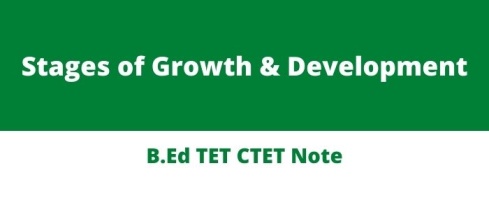Growth and development: Development is a continuous process that occurs throughout the life of an individual. This life long process of development has been described as a series of stages on the basis of age and age related characteristics by several eminent psychologists. In this article, the stages of growth and development of child will be discussed. Read the full article to know the different stages of development.
Related:
Meaning of growth and development
In simple word, growth refers to the physical changes like the increase in height, and weight and sizes etc. It is generally confined to the quantitative changes. And the Development refers to the improvement of functioning. It continues throughout lifespan of an individual. Most of the developmental psychologists have been used Growth and development interchangeably because both the process is interrelated and interdependent on each other. To know the concept, difference and principles of development please visit: Growth & Development.

What is the stages of child development?
Development is a continuous process that goes over the entire lifespan of human beings. This lifelong process of development has been described as a series of stages on ground of age and age related characteristics by several eminent psychologists including Jean Jack Rousseau, Earnest Jones, Sigmund fraud, Jean Piaget and Laurence Kohlberg. These stages are called as the stages of development.
Developmental stage is a period in which individuals show unique characteristic behavioral patterns and grow in particular capacities. Though a uniform pattern or a sequence is followed by all individuals, developmental characteristics in psycho-physical changes may be seen at different ages among different individual. Moreover, the movement of an individual from one stage to another is not sudden but slow and gradual.
Different stages of growth and development
The classification of human development into different stages has been made by psychologists for the convenience of studying the process of development. This is why different psychologists differ with respect to their description of the developmental stages. And there is no standard classification of human developmental stage. However, the different stages of development according to different psychologists have given below.
Elizabeth Hurlock has divided child development into several stages which are given below in tabular format.
| Stages | Time period |
| 1. Prenatal Period | Conception to birth(280 days) |
| 2. Infancy | Birth to 2 weeks (14 day) |
| 3. Babyhood | 2 weeks to 2 years. |
| 4. Childhood | 2 to 12 years. |
| Early childhood | 2 to 6 years. |
| Late childhood | 6 to 12 years. |
| 5. Adolescence | 12 to 21 years. |
| Pre adolescence | 12 to 16 years. |
| late adolescence | 16 to 21 years. |
| 6. Adulthood | 21 to 65 years. |
Stages of development by Rousseau
Rousseau was the first to have given the comprehensive and division of human development. He has divided 4 stages of growth and development which are Infancy, childhood, early adolescence and late adolescence. The time period of these stages are-
- Infancy period- (0 to 5 years)
- Childhood- (5 to 12 years)
- Early childhood- (12 to 15 years)
- Late Childhood- (15 to 20 years)
Stages of development according to Ernest Jones
Earnest Jones has divided the stages of development which is similar to the division of Rousseau. He also divided into 4 stages which are-
- Infancy- (0-5 years)
- Late childhood- (5 – 12 years)
- Adolescence- (12-18 years)
- Maturity- (above 18 years)
Ryburn stages of development
W.M Ryburns has provided another division of stages of child development which are more analytical and comprehensive. Stages of development according to Ryburns are given below.
- Infancy period: 0- 2.5/3 years.
- Early childhood: 3- 6/7 years.
- Transition period: 6-/7- 8 years.
- Late childhood: 8 – 12 years.
- Early adolescence: 12- 14 years.
- Late adolescence: 14 – 18 years.
stages of growth and development Conclusion
Thus Growth and development is an important section of pedagogy. Growth is the physical changes of an organism for example increase of body size height weight etc of an individual is simply refers to growth which are quantitative. On the other hand, development is quantitative as well as qualitative changes. Development is the funtional improvement in behaviour that brings qualitative chnages which can not be measure d directly. This lifelong process of growth and developemnt are divided into several stages which have discussed above. Know the Principles of Development.
Reference: